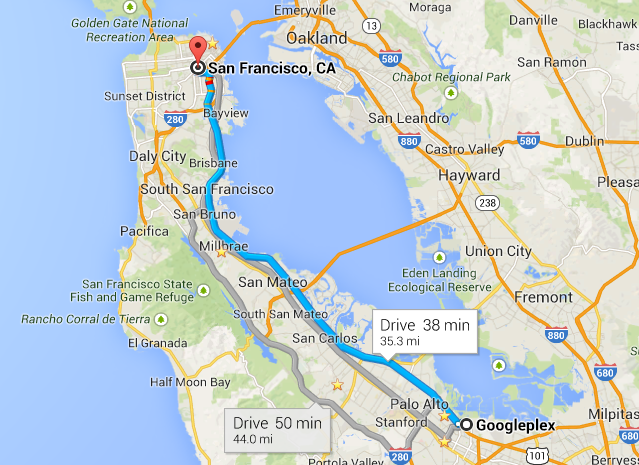 This post first appeared in the San Jose Mercury News
This post first appeared in the San Jose Mercury News
I have mixed feelings when I see those mostly double-deck buses on Highway 101 shuttling tech workers between Silicon Valley and San Francisco. Based on a recent survey, so do San Francisco voters. On one hand, I’d much rather see the buses than the thousands of cars they replace. The shuttles, according to the San Francisco Municipal Transportation Agency, transport more than 35,000 people a day and eliminate at least “45 million vehicle miles traveled and 761,000 metric tons of carbon every year from the region’s roads and air.”
As a fellow driver on 101, I also feel safer sharing the road with a relatively small number of professional bus drivers versus thousands of tired and distracted tech workers. And while it might not benefit me or the public, I am glad to know that the workers in these companies have the option of being more relaxed or productive during their commute.
Impact on communities

But like many in the Bay Area, I also worry about their impact on local communities.
The concern among some San Franciscans is well known. There are vocal critics who say that the demands of well-heeled Silicon Valley tech workers are pricing lower and even middle-income San Franciscans out of the housing market. There is also concern about the impact they’re having on the culture of the city.
A sour note for some musicians
Inexpensive food joints are being replaced by upscale restaurants that many locals can’t afford and might not even enjoy. Artists and musicians are leaving the city. My professional musician son, Will Magid, who left San Francisco last year for other reasons, told me that the low-cost apartment he rented in the Mission district is now much more expensive than it was when he left about a year ago. The reasons people are leaving, he said “are both economic and cultural.” It’s not just increased rent, it’s also changes to the fabric of the community.
Yet, a recent survey conducted by EMC Research and commissioned by the Bay Area Council, a business organization, shows that most San Franciscans have a positive attitude about tech workers. The survey of 500 likely San Francisco voters conducted earlier this month found that 72 percent have a favorable opinion of tech workers, while 56 percent were strongly or somewhat favorable to employee shuttle buses. Nearly 80 percent feel that recent growth in the tech sector has been good for San Francisco.
But the survey also found that less than half of respondents (45 percent) said that their household has “benefited from the recent growth in the technology sector,” with 26 percent strongly disagreeing with that assertion. And nearly 6 in 10 (59 percent) said that “preventing eviction and neighborhood gentrification” is important or very important.
Affects Silicon Valley too
While I empathize with our neighbors in San Francisco, I also worry about what this northerly migration is doing to Silicon Valley. Just as cities started to suffer in the 1940s, ’50s and ’60s as workers moved to the suburbs, I worry that Silicon Valley is not taking full advantage of the energy and cultural and economic benefits we might otherwise enjoy if more of these workers were living in Palo Alto, Mountain View, San Jose, Sunnyvale and Redwood City and other parts of Silicon Valley.
While Silicon Valley is far from a ghost town on weekends, it’s not nearly as vibrant as San Francisco. Much of that is inevitable considering the uniqueness of San Francisco, but I can’t help wonder what the night life and music scene would be like in the valley if more young and well-paid tech workers lived here.
I also wonder whether the tech industry is having as much impact on local business as it could. I frequently patronize restaurants not far from Google and Facebook and don’t see large crowds at lunch time. Why should workers spend the time and money to eat off-campus when they have great free food right at work? Sure, those companies are employing cooks and other service workers, but it would be nice to share a bit more of the wealth with local businesses.
Of course, wherever tech workers live, they’ll need things like clothing, toothpaste, shoes and other necessities that once helped local businesses thrive. But, thanks to Amazon and other online merchants, even that trickle-down effect is severely diminished.
But I must admit I’m a bit jealous. No one offered me a free ride during the years I commuted between my home in Silicon Valley and my office in San Francisco. For that matter, no one offered me free meals, free laundry service, subsidized day care or many of the other perks some Silicon Valley tech workers enjoy.